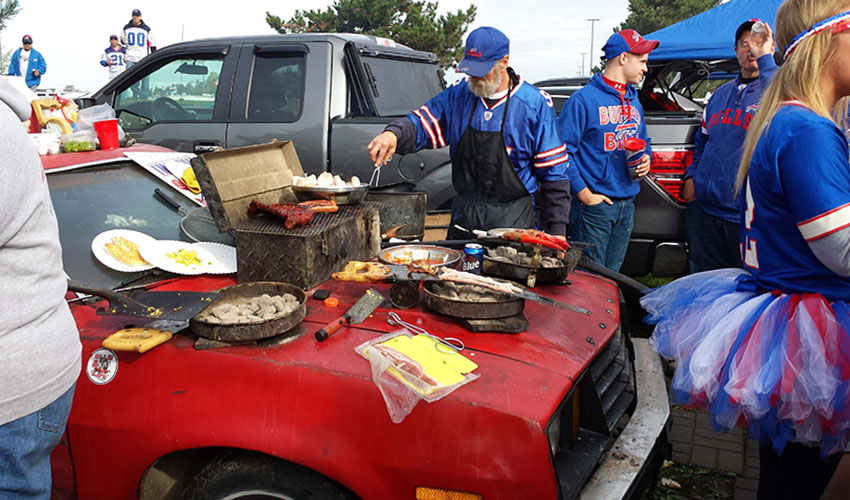Tailgate rituals rival games for spectacle

Tailgaters creatively repurposed a defunct Ford Pinto as a grill in Buffalo.
SF State and Cal State East Bay professors explore game-day parking lot scenes
It’s football season, and millions of Americans are mesmerized by hard-hitting pro and college games. But two researchers say what’s happening just outside the stadium is just as fascinating as what’s going on inside. San Francisco State University Associate Professor of Kinesiology Maria Veri and Cal State East Bay Professor of Kinesiology Rita Liberti spent five years studying media representations of tailgate parties and traveling to college and pro stadiums all over the U.S. Their goal? Figuring out what makes tailgaters tick. In the process, they’ve completed one of the first comprehensive studies of the phenomenon.
“When we started to research tailgating, we found that no one had really done a history even though it’s been going on since the early 20th century,” said Veri. “It’s grown and grown throughout the 21st century. It used to be a modest picnic affair, but then it became more and more involved, with different kinds of food, small hibachis popping up on the blacktop, then smokers and RVs.” A whole new genre of magazines and cookbooks geared toward men focuses on tailgate meals and culture.
Some of the researchers’ observations did not surprise them — tailgating is still a predominantly white heterosexual male enterprise, for instance. “And there’s a lot of meat,” said Veri. “Meat is prized, and red meat especially is a signifier of masculinity. That came across in the media representations and cookbooks we looked at and what we saw on the blacktop.”
But the level of spectacle, competition and creativity did surprise them. They saw RVs and pickup trucks with grills welded into their backs; a converted school bus painted gold and green (University of Oregon school colors) with a deep freezer, microwave and smoker; an old Ford Pinto with sausage and peppers grilling on it; pulled pork in a wheelbarrow; even an old World War II helmet in which chicken wings were being deep fried.
“It makes cooking more masculine when you’re using a tool instead of a kitchen gadget,” Veri said.
According to Veri and Liberti, tailgaters spend an incredible amount of time, energy and money prepping for the tailgate and preparing their meals.
“Some start on a Monday to get ready for a Saturday game,” said Veri. “They have spreadsheets and elaborate menus. But where we really saw competitiveness is when they prepare food related to the opposing team — so they’re symbolically eating the other team’s mascot.” At a San Francisco 49ers game against the Baltimore Ravens, for example, the 3dRailNiners tailgate group jokingly offered “grilled raven” on the menu.
Such antics aren’t just a show of team spirit. As Veri and Liberti see it, it’s how super-fans compete for attention themselves.
“Tailgaters are engaged in public performance; it’s their way of being able to not just watch from the sidelines,” said Veri. “If you’re cooking over a hot flame and things are sizzling, you can put on a show for the folks around you. It’s definitely part of the masculinity.”
And tailgate parties, like their teams, vary regionally. Bay Area tailgaters tend to be more diverse, with African American and Latino tailgaters participating. Still, even in open-minded San Francisco, diversity on the grill isn’t always welcomed.
“We didn’t speak with any vegetarians, but at Levi’s Stadium there was a guy grilling turkey burgers, which was bad enough to the other tailgaters,” said Veri. “Then one week he snuck carrots into the burgers, and they almost kicked him out.”
Veri and Liberti took a lot of kidding about their research topic and how they’d lucked into it. “We got comments like ‘Oh, it’s just men and meat, what more is there to it’?” Veri said. Their takeaway, though, is that tailgating is much more complex than “men and meat.”
“It is so much more,” Veri said. “We learned more about how gender is constructed in society, particularly masculinity around food. If you look at food symbolically, meat is often at the center, then veggies and non-meat dishes at the margins — as women are.”
The University of Arkansas Press will publish a book based on Veri and Liberti’s research, Gridiron Gourmet: Gender and Food at the Football Tailgate, in 2019. Their first article on the topic was published in The Journal of Sport and Social Issues in 2013. http://journals.sagepub.com/doi/pdf/10.1177/0193723512472897